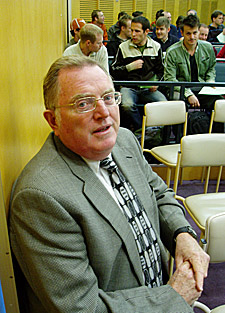 The significance of the Lord’s Prayer has been brought home to Moore College students thanks to Dr Gerald Bray, an internationally renowned Anglican scholar.
The significance of the Lord’s Prayer has been brought home to Moore College students thanks to Dr Gerald Bray, an internationally renowned Anglican scholar.
Dr Bray has been lecturing at Moore College as part of its 150th anniversary celebrations.
"Prayer is a means of grace", he says, "a way of drawing closer to God."
The Lord's Prayer is more than just a formula to be repeated, he says.
"It's a form of teaching, a systematic theology."
Speaking as part of the Annual Moore College Lectures, Dr Bray says theology is vital to healthy ministry.
"Systematic theology is closely connected with the exposition of scripture, and pastoral ministry", he says.
"You preach your theology, whether you acknowledge it or not."
"So it's got to have pastoral relevance", he continues.
"Take a Bible passage and say: What does this say about God? What does it say about God's plan? What does it say about me? Ask these fundamental questions; use this text as a way to expound the general pattern of scripture."
Dr Bray is Director of Research for the Latimer Trust, an Anglican research institution at Cambridge.
"My job is to present a conservative Evangelical position within the Anglican Communion worldwide", he says.
"In the last ten years, since the spread of the internet, we have a global church. All over the world, people find themselves caught up in the same issues. So we need to work together."
Sydney Diocese is playing its role in advancing Evangelical research.
"In the last ten years, most of the work on the doctrine of scripture has been done by Anglicans", says Dr Bray.
"Here in Sydney you have Peter Jensen and Mark Thompson, both of whom have written on the subject."
Dr Bray is very impressed with Moore College.
"There's a good fellowship, the student body seems to be very harmonious", he says.
"And yet what's struck me most of all is that people are not cloned. There's always a danger that a model's established, and everyone's expected to be the same. I don't see that here. People are given the freedom to be themselves. And that's very good, because no one's perfect. To follow a leader like that is unhealthy."
Dr Bray is also pleased with the facilities.
"The library is extremely well stocked", he says, "and I'm impressed by the level of student use."
So it's not like that elsewhere?
"No, not at all!", he says with a laugh. "People take their studies very seriously here, I'm very impressed."
The admiration has been mutual.
"I expected intellectual rigour with lots of Greek and lofty thoughts", says first year student Josh Taylor.
"But what I got was more pastoral, easier to understand and apply, but also stimulating".
"It's been very engaging", says Jenny Von Behr of third year.
"He's expanded my thinking about the Lord's Prayer, and deepened the meaning of each line for me. I'm looking forward to reflecting on it some more, and what it means for me as I pray it."
Dr Bray hopes his lectures will help the students serve the people in their churches.
"Theological knowledge is meant to help church members grow spiritually, and help in evangelism", he says.
"I hope to see people translating theology into simple language that touches ordinary people in the pew. If I come back in ten years and find this has happened, then I'll be more than happy."






















